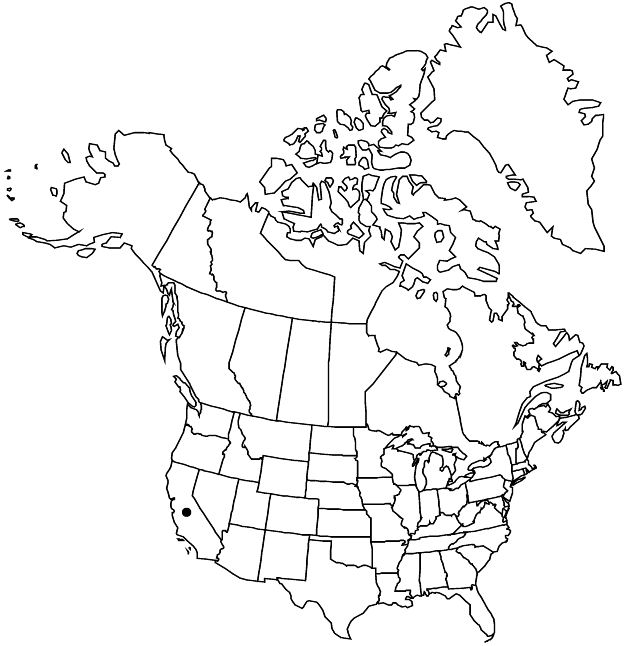Ceanothus prostratus var. occidentalis
Ceanothus, 262. 1942.
Common names: Cobb Mountain ceanothus
EndemicConservation concern
Synonyms: Ceanothus divergens subsp. occidentalis (McMinn) Abrams
Revision as of 17:14, 29 July 2020 by imported>Volume Importer
Shrubs, 0.1–0.3 m, matlike to moundlike. Stems prostrate, spreading, or ascending. Leaf-blades slightly folded lengthwise adaxially, margins ± wavy, teeth 5–9. Capsule horns spreading, not conspicuously rugose. 2n = 24.
Phenology: Flowering Apr–May.
Habitat: Gravelly or rocky soils derived from volcanic substrates, open flats and ridges, conifer forests.
Elevation: 800–1400 m.
Discussion
Variety occidentalis is known from only a few localities in the mountains of Lake, Mendocino, Napa, and Sonoma counties. L. Abrams and R. S. Ferris (1923–1960, vol. 3) treated it as part of Ceanothus divergens, based partly on leaf morphology, but its life form and fruit morphology suggest a closer relationship to C. prostratus.
Selected References
None.
Lower Taxa
None.
"thick" is not a number.
... more about "Ceanothus prostratus var. occidentalis"
pale green +
glabrous +
dark green +
glabrate +
dehiscing +
rounded +
cuneate +
not gland-dotted +
elliptic;obovate +
leathery +
not thorn-tipped +
pliable +
absent +
spreading +
rugose +
lobed +
Cobb Mountain ceanothus +
aggregated +
Calif. +
leathery +
bisexual +
loculicidal +
Gravelly or rocky soils derived from volcanic substrates, open flats and ridges, conifer forests. +
subapical +
prominent +
0mm;0.5mm +
fascicles +
axillary +
umbel-like +
simple +
not fascicled +
crowded +
usually longer +
dentate +
wavy +
dentate to spinose-dentate +
not revolute +
thick +
pale;deep blue or purplish blue +
free +
intrastaminal +
absent +
fleshy +
basal +
anatropous +
absent +
not fleshy +
not fleshy +
hooded +
opposite +
absent +
absent +
2-4-carpellate +
Ceanothus, +
1942 +
absent +
intermediate +
valvate +
distinct +
keeled;lanceolate;deltate +
longitudinal +
rooting +
1;4 +
persistent +
absent +
wartlike +
veined +
connate +
Ceanothus prostratus var. occidentalis +
Ceanothus prostratus +
variety +
not gland-tipped +
spinulose +
strigillose +
evergreen +
moundlike +
woody +
